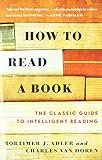[0] https://www.amazon.com/How-Read-Book-Classic-Intelligent/dp/...
I highly recommend this book for that reason: https://www.amazon.com/How-Read-Book-Classic-Intelligent/dp/...
[1] https://www.amazon.com/How-Read-Book-Intelligent-Touchstone/...
[0]https://www.amazon.com/How-Read-Book-Intelligent-Touchstone/...
As from what the linked article says,
The technique is simple:
1. Get a piece of paper
2. Write at the top the idea or process you want to understand
3. Explain the idea, as if you were teaching it to someone else
What’s crucial is that the third step will likely repeat some areas of the idea you already understand. However, eventually you’ll reach a stopping point where you can’t explain. That’s the precise gap in your understanding that you need to fill.
When reading blogs, HN comments, novels etc., I usually read it once just like I'm watching television or a movie.
I don't worry that I read slow since when I've found out that Donald Knuth also reads novels very slowly[1].
If you want a more systematic reading, there is a book[2] which has been mentioned often here in HN.
> Is there an app that you use?
I use org-mode for everything
[0] - http://calnewport.com/blog/2012/10/26/mastering-linear-algeb...
[1] - http://www-cs-faculty.stanford.edu/~uno/retd.html
[2] - https://www.amazon.com/How-Read-Book-Intelligent-Touchstone/...
Wait, what?
I've been reading a book called, I kid you not, "How to Read a Book: The Classic Guide to Intelligent Reading."
Adler and Doren identify four levels of reading:
1. Elementary: "What does the sentence say?" This is where speed can be gained
2. Inspectional: "What is the book about?" Best and most complete reading given a limited time. Not necessarily reading a book from front to back. Essentially systematic skimming.
3. Analytical: Best and most complete reading given unlimited time. For the sake of understanding.
4. Synoptical: Reading many books of the same subject at once, placing them in relation to one another, and constructing an analysis that may not be found in any of the books.
Amazon link for those interested: https://www.amazon.com/How-Read-Book-Intelligent-Touchstone/...
It expounds on what is mentioned in the blog post, and it is something I really wish I had truly grasped when I was in college, but has helped immensely since then.
It serves two useful purposes.
1. It provides a framework for thoroughly digesting important books.
2. It is a rich vein of humour for visiting friends to mine when they spot it on your book shelf.
http://www.amazon.com/How-Read-Book-Touchstone-book/dp/06712...
http://www.amazon.com/How-Read-Book-Touchstone-book/dp/06712...
http://www.amazon.com/How-Read-Book-Touchstone-book/dp/06712...
With non-technical books (literature, history, quality-of-life), most of the time will be invested into actual reading, with a bit of pondering and maybe discussing. We can have a conversation right away, and there's still knowledge and insight to be gained.
Here are some non-technical books I'd like to read:
* How to Read a Book - http://amazon.com/dp/0671212095
* Influence: The Psychology of Persuasion - http://amazon.com/dp/006124189X
* Liar's Poker - http://amazon.com/dp/0140143459
* Growing a Business - http://amazon.com/dp/0671671642
I read that for a high school english class, and it changed the way I read. It teaches you how to absorb more information in less time.


* Write a short summary of a chapter after reading it
* Don't be afraid to to write notes and highlight important lines in the book if you own it. You own it so make it yours! If you do want to avoid marking it up 3m makes some nice transparent post it's that I find work well (https://www.post-it.com/3M/en_US/p/d/cbgbjrus3149/)
* Before reading the book do you have a specific reason for doing so? If so look at the index at the back and read the sections that are specifically relevant first so that you will have some repetition reading the content.
For me personally I read a lot of non-fiction and like to have the books as reference material so 75% of the books I own are physical. When I read them I highlight important / relevant passages to me and possible make notes in the side margins if I find it relates to another book I have read and remember.
After finishing the book I'll eventually type out the relevant lines I found then and put them on my personal site for easy referencing for my self. This is doubly helpful as it means I'll often re-read the book down the line further reinforcing what I've read. I do have quite the backlog for this but it equally means that if I need to go back looking for a specific snippet on something I likely have it highlighted
I'd also second the recommendation for "How to Read a Book" by Mortimer J. Adler https://www.amazon.ca/How-Read-Book-Mortimer-Adler/dp/067121...